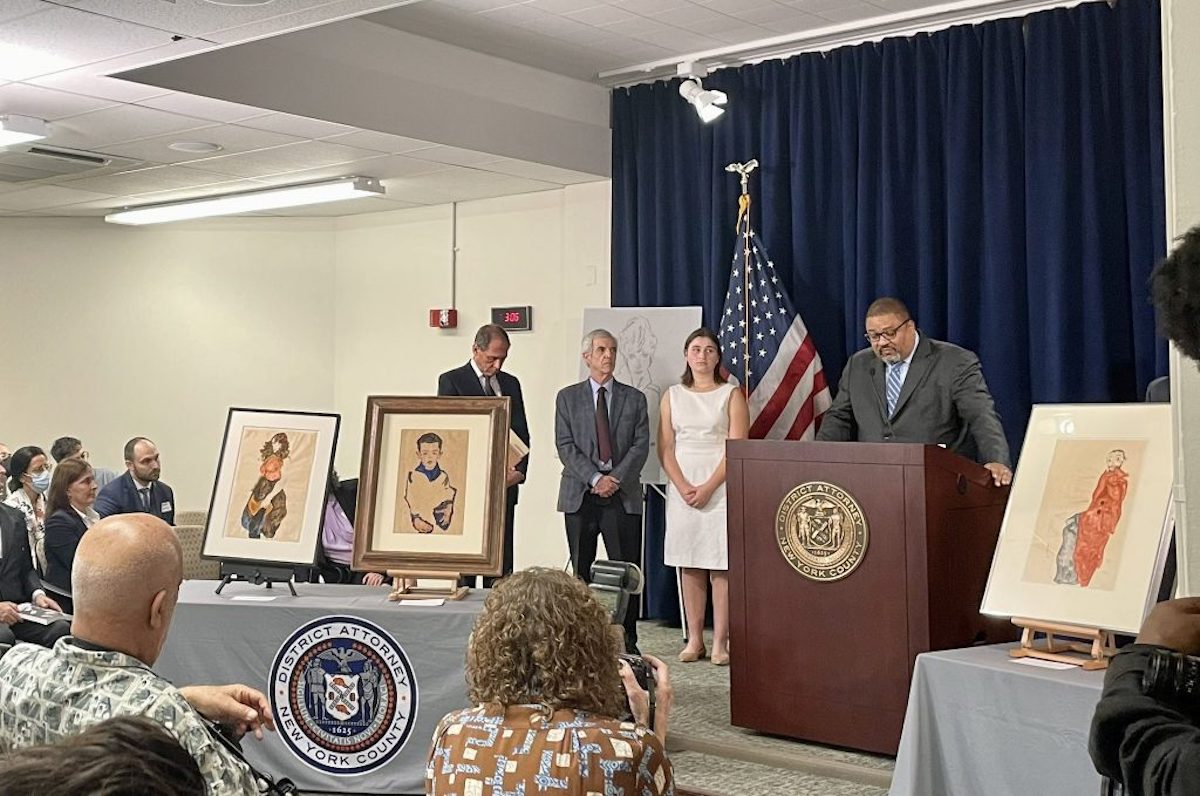Seven significant artworks by the Austrian artist Egon Schiele have been restituted to the family of the Jewish art collector Fritz Grünbaum. The Nazis forced Grünbaum to sell his collection at a knockdown price while he was locked in a concentration camp during World War II.
Manhattan District Attorney Alvin Bragg said, “This is a crucial turning point for the Grünbaum descendants’ decades-long fight to have these and other Schieles restituted”. 80 Schiele pieces were known to be owned by Grünbaum, who died at Dachau in 1941.
The museums where the pieces were held included the Museum of Modern Art (MoMA) NY, the Morgan Library & Museum in New York, the Santa Barbara Museum of Art in California. All have agreed to give the pieces voluntarily to prosecutors after learning that they had been stolen.

The works on paper are valued at between $780,000 (£633,000) and $2.75m apiece, some had been on display at prominent museums in the US.
Fritz Grünbaum (1880-1941) was a Jewish art collector, cabaret performer, and lawyer who lived in Vienna, Austria, during the early 20th century. He is remembered not only for his significant art collection but also for his contributions to Vienna’s cultural and artistic life.
Here are some critical aspects of Fritz Grünbaum’s life and legacy:
Art Collection: Grünbaum was an avid art collector interested in Expressionist and Cubist artworks. His collection included pieces by prominent artists such as Egon Schiele, Gustav Klimt, and Oskar Kokoschka. His collection was notable for its avant-garde and modernist character, reflecting the artistic developments of the time.
Cabaret Performer: In addition to his passion for collecting art, Grünbaum was also known for his involvement in Vienna’s cabaret scene. He performed in and managed various cabaret shows, contributing to the vibrant cultural atmosphere of Vienna in the early 20th century.
 Egon Schiele artworks stolen by Nazis
Egon Schiele artworks stolen by Nazis
Persecution under the Nazis: Tragically, Grünbaum’s life took a dark turn with the rise of the Nazi regime in Austria. As a Jew, he faced increasing persecution and was eventually arrested and imprisoned in the Dachau concentration camp in 1938. While in captivity, he continued to create art and write poems.
Disputed Art Collection: Grünbaum’s art collection became a subject of controversy and legal disputes after his arrest. The Nazis confiscated many of his artworks during World War II, and the fate of these pieces remained unclear for decades.
Posthumous Recognition and Restitution: Fritz Grünbaum perished in the Dachau concentration camp in 1941. In the years following World War II, efforts were made to recover and restitute the looted artworks from his collection. Some pieces were returned to his heirs, but many remained missing or disputed for years.
Ongoing Legacy: Grünbaum’s story and other Jewish collectors and artists persecuted by the Nazis have drawn attention to the importance of restitution efforts and the continuing efforts to identify and recover looted art stolen during the Holocaust. His life and the fate of his art collection have been the subject of exhibitions, documentaries, and legal battles.
Fritz Grünbaum’s life serves as a poignant reminder of the devastating impact of Nazi persecution on the lives of Jewish individuals and the cultural heritage they created and collected. His enduring legacy lives on through the ongoing efforts to recover and preserve the art that was unjustly taken from him during one of history’s darkest chapters.
Top Photo: Egon Schiele artworks owned by Fritz Grünbaum, who was a Holocaust victim Courtesy of the NY DA’s Office.
Read More

